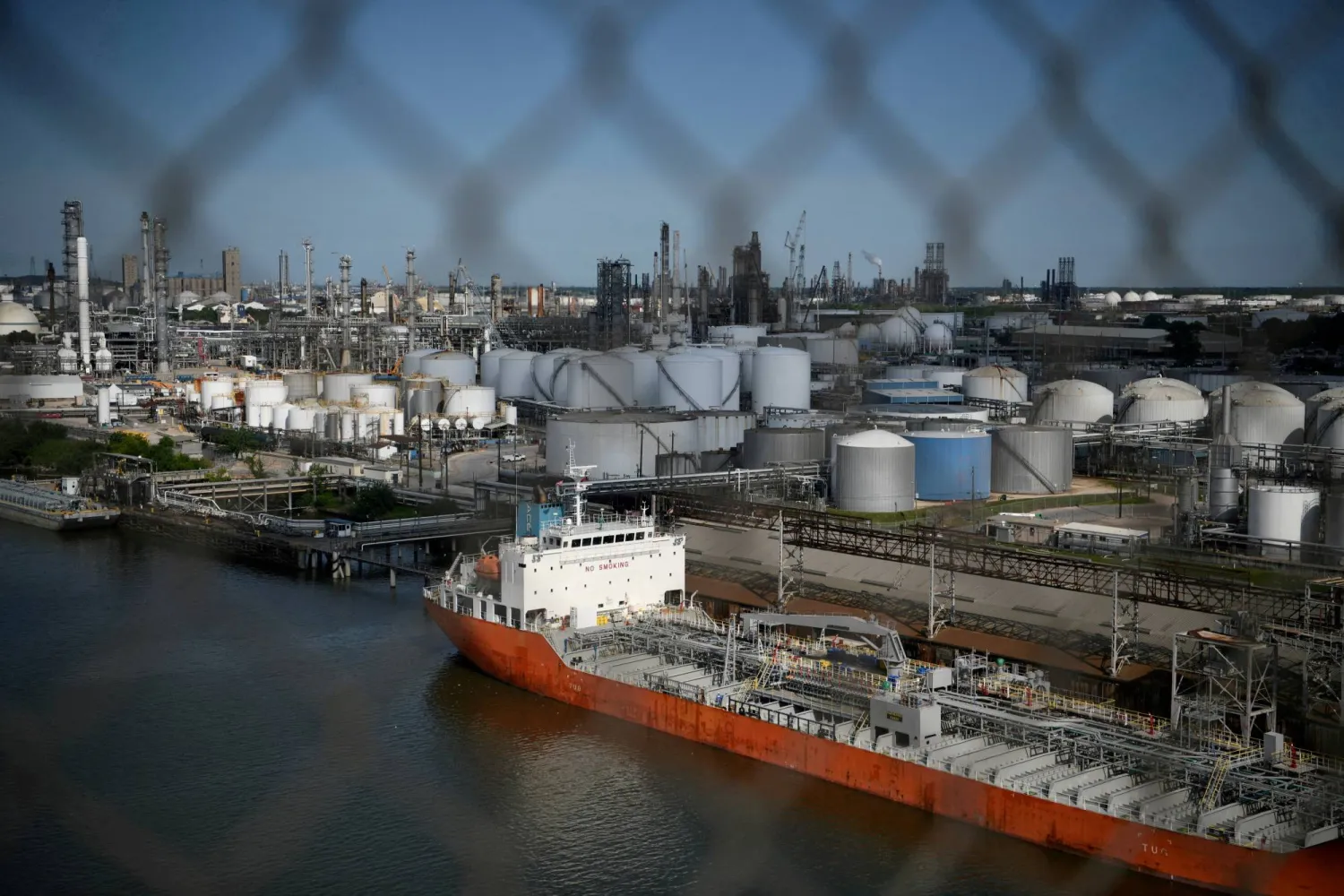An American-owned oil tanker long suspected of carrying sanctioned Iranian crude oil began offloading its cargo near Texas late Saturday, tracking data showed, even as Tehran has threatened to target shipping in the Arabian Gulf over it.
Ship-tracking data analyzed by The Associated Press showed the Marshall Islands-flagged Suez Rajan was undergoing a ship-to-ship transfer of its oil to another tanker, the MR Euphrates, near Galveston, some 70 kilometers (45 miles) southeast of Houston.
The fate of the cargo aboard the Suez Rajan has become mired in the wider tensions between the US and Iran, even as Tehran and Washington work toward a trade of billions of dollars in frozen Iranian assets in South Korea for the release of five Iranian-Americans held in Tehran.
Already, Iran's paramilitary Revolutionary Guard has warned that those involved in offloading the cargo “should expect to be struck back.” The US Navy has increased its presence steadily in recent weeks in the Mideast, sending the troop-and-aircraft-carrying USS Bataan through the Strait of Hormuz in recent days and considering putting armed personnel on commercial ships traveling through the strait to stop Iran from seizing additional ships.
US officials and the owners of the Suez Rajan, the Los Angeles-based private equity firm Oaktree Capital Management, did not immediately respond to requests for comment.
The saga over the Suez Rajan began in February 2022, when the group United Against Nuclear Iran said it suspected the tanker carried oil from Iran’s Khargh Island, its main oil distribution terminal in the Arabian Gulf.
For months, the ship sat in the South China Sea off the northeast coast of Singapore before suddenly sailing for the Gulf of Mexico without explanation. Analysts believe the vessel's cargo likely has been seized by American officials, though there still were no public court documents early Sunday involving the Suez Rajan.
In the meantime, Iran has seized two tankers near the Strait of Hormuz, including one with cargo for US oil major Chevron Corp. In July, the top commander of the Revolutionary Guard's naval arm threatened further action against anyone offloading the Suez Rajan, with state media linking the recent seizures to the cargo's fate.
“We hereby declare that we would hold any oil company that sought to unload our crude from the vessel responsible and we also hold America responsible,” Rear Adm. Alireza Tangsiri said at the time. “The era of hit and run is over, and if they hit, they should expect to be struck back."
Iran's mission to the United Nations did not immediately respond to a request for comment over the offloading of the Suez Rajan. The state-run IRNA news agency acknowledged this AP story, but did not elaborate. Western-backed naval organizations in the Arabian Gulf in recent days also warned of an increased risk of ship seizures from Iran around the Strait of Hormuz.
Iran’s 2015 nuclear deal with world powers saw it regain the ability to sell oil openly on the international market. But in 2018, then-President Donald Trump unilaterally withdrew from the accord and re-imposed American sanctions. That slammed the door on much of Iran’s lucrative crude oil trade, a major engine for its economy and its government. It also began a cat-and-mouse hunt for Iranian oil cargo — as well as a series of escalating attacks attributed to Iran since 2019.
The delay in offloading the Suez Rajan's cargo had become a political issue as well for the Biden administration as the ship had sat for months in the Gulf of Mexico, possibly due to companies being worried about the threat from Iran.
In a letter dated Wednesday, a group of Democratic and Republican US senators asked the White House for an update on what was happening with the ship's cargo, estimated to be worth some $56 million. They said the money could go toward the US Victims of State Sponsored Terrorism Fund, which compensates those affected by the Sept. 11 attacks, the 1979 Iran hostage crisis and other militant assaults.
“We owe it to these American families to enforce our sanctions,” the letter read.
The US Treasury has said Iran's oil smuggling revenue supports the Quds Force, the expeditionary unit of the Revolutionary Guard that operates across the Mideast.
Claire Jungman, the chief of staff at United Against Nuclear Iran, praised the transfer finally happening.
"By depriving the (Guard) of crucial resources, we strike a blow against terrorism that targets not only American citizens but also our global allies and partners,” Jungman told the AP.
On Sunday, Iranian state media released still images from video that showed the USS Bataan with small Guard fast boats trailing it as it traveled through the Strait of Hormuz, the narrow mouth of the Arabian Gulf through which 20% of the world's oil passes. One image appeared to have been taken from a drone above the Bataan.
Cmdr. Rick Chernitzer, a spokesman for the US Navy’s Bahrain-based 5th Fleet, acknowledged to the AP that the Bataan had transited through the strait in recent days. He declined to elaborate.
A Tanker Believed to Hold Sanctioned Iran Oil Starts Offloading near Texas despite Tehran's Threats

FILE PHOTO: The Houston Ship Channel and adjacent refineries, part of the Port of Houston, are seen in Houston, Texas, US, May 5, 2019. REUTERS/Loren Elliott//File Photo

A Tanker Believed to Hold Sanctioned Iran Oil Starts Offloading near Texas despite Tehran's Threats

FILE PHOTO: The Houston Ship Channel and adjacent refineries, part of the Port of Houston, are seen in Houston, Texas, US, May 5, 2019. REUTERS/Loren Elliott//File Photo
لم تشترك بعد
انشئ حساباً خاصاً بك لتحصل على أخبار مخصصة لك ولتتمتع بخاصية حفظ المقالات وتتلقى نشراتنا البريدية المتنوعة







